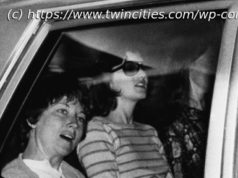After two years in retirement, the former late-night staple will return to TV in 2018 with a show more in line with National Geographic’s ‘Years of Living Dangerously.’
David Letterman is returning to the small screen but his forthcoming Netflix talk show will be more in line with National Geographic docuseries Years of Living Dangerously — in which he traveled to India — than The Late Show.
Two years after he retired from the broadcast late-night space after more than 6,000 episodes on CBS’ Late Show and NBC’s Late Night, Letterman is looking for something more serious. That includes dream interviews with Kim Jong-un and President Donald Trump and a field visit to Selma, Alabama.
« About six months ago I was polishing my collection of buffalo head nickels and I thought, ‘Geeze, there must be something else I can do with my life, ‘ » Letterman told The Hollywood Reporter on Tuesday afternoon, hours after Netflix announced his return to the small screen after two years in retirement.
Each of the six hourlong episodes, which will be pre-recorded, will feature Letterman conducting longform conversations with a singular guest taped before a live studio audience as well as solo field segments exploring topics on his own.
Below, Letterman talks with THR about what drew him out of his (brief) retirement, why Netflix was appealing and what to expect from the show when it launches in 2018.
What made the time right to return to TV?
About six months ago I was polishing my collection of buffalo head nickels and I thought, « Geeze, there must be something else I can do with my life. » I spent a lot of time with Al Franken and I had seen and admired how his life has unfolded in clearly two different parts and two different areas and been beneficial to the culture in both incarnations. I’d done a few things with Al and so enjoyed them that I thought I wanted to do something else like this. A couple years ago, I went to India for National Geographic and the two influences made me think that perhaps there was more to television than what I had done for the last 30 years. The people at Netflix and Radical Media, we started chatting and I was very impressed by both organizations. The idea that it’s a just a commitment for six shows — it’s going to take up some time but it’s not going to be 10 hours a day, five days a week. The need to pursue something else and the way that this was made available as a possibility was irresistible, honestly.
Have you started looking at a guest list?
I want to talk to this Kim Jong-un because I see now where he’s just miniaturized a nuclear weapon that he’s going to put on his rockets I’d like to talk to this guy because, OK, the haircut. We get all of that. But honestly, what does he want? They have a missile they think can hit Chicago, what’s he pissed off at Chicago about? Are we at war with this guy? We put sanctions on him, he gets more pissed off. If Dennis Rodman goes over there, I ought to be over there.… I wouldn’ t want to make it worse, but on the other hand, I don’t know that you can make it worse. OK, you’re building rockets; you’ve got nuclear capabilities; OK great. What, really, does that help?!
Is he in line with the type of guests you’re aiming for all six episodes?
I don’t know that he’d be the prototypical guest but by god, wouldn’t you like an hour to just look at this guy and talk to him and listen to him? Does he have kids? Does he have pets? Why does he want to behave like this? If he wants to be a hero, why not start trying to reunite the peninsula? Why not do something that has some humanity to it? I don’t get this.
You’ve interviewed Donald Trump a number of times over the years. Is he someone you’d like to speak with on this show?
Yes, I really would love to talk to him. That would be great because I think I have insight now that heretofore I did not have. I’m tired of people saying, « Can you believe he… » and « Oh my god, what has he done…. » I want to put an end to that. We all know that there’s something unique here. We don’t need to keep examining it day after day after day. What we need now is somebody like myself to sit down with him and calmly get him to sign some papers and then have him leave the White House.
How competitive was it to get you back on TV? And how will Years of Living Dangerously influence the Netflix show?
People were phoning night and day! Years of Living Dangerously was great because I got to talk to people who lived in India, the local people, government officials, to Prime Minister Narenda Modi and it was great. I just thought, what a luxury. This is fantastic; nobody gets to do this. And I loved everything about it and went to India with a certain level of trepidation not having been there before and it turned out to be a great experience, in terms of a learning experience. Anytime one learns something, one would hope that it’s passed on and the culture can be advanced in some tiny way. So yes, that was a big influence in looking for some other project. When I was looking at Radical Media and the stuff they’ve done and the idea that it could be on Netflix, it was like somebody gave me a brand new car.
Tonally speaking, it sounds like the Netflix show will be much more serious than what viewers have seen over the past 30 years. Is that fair to say?
I’m of the opinion that irrespective of the topic and regardless of who you’re talking with — I just think if you go to dinner with Person A or Person B, sooner or later there’s going to be something funny that happens or is said that is either in context of a greater topic or adjunct to a greater topic. I don’t have a news background or a journalism background but I have to believe there will be some silliness regardless. Maybe I’m wrong, but that’s the nice thing we’ll find out.
What are you envisioning for your field pieces?
In 1965, when they went down to Selma, Alabama — the Freedom Riders — it was voter registration rights and they were going to march across the Edmund Pettus Bridge — I was 18. That happened in March. In April 1965, I went to the Bahamas on spring break and when I started looking at what the people were doing in Selma in 1965 a month earlier when I was in the Bahamas, I started to think: « Wait a minute, why didn’t I know about that? Why was I ignorant about that? » I was in the Bahamas because you could get drunk and these people are down there, fighting for voter registration rights — like it was 10 percent of the black population were allowed to register to vote and mayhem and violence and injuries took place.




